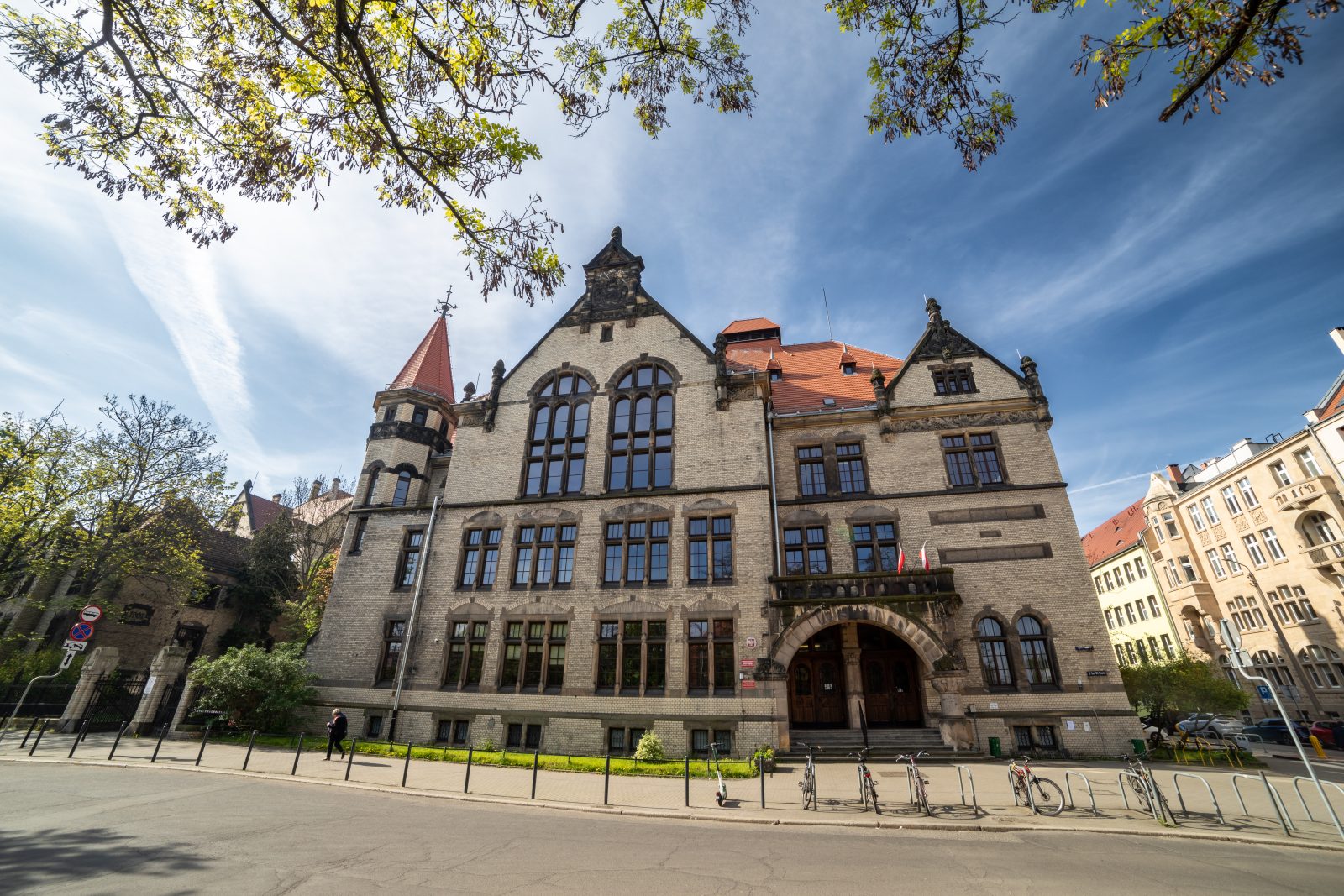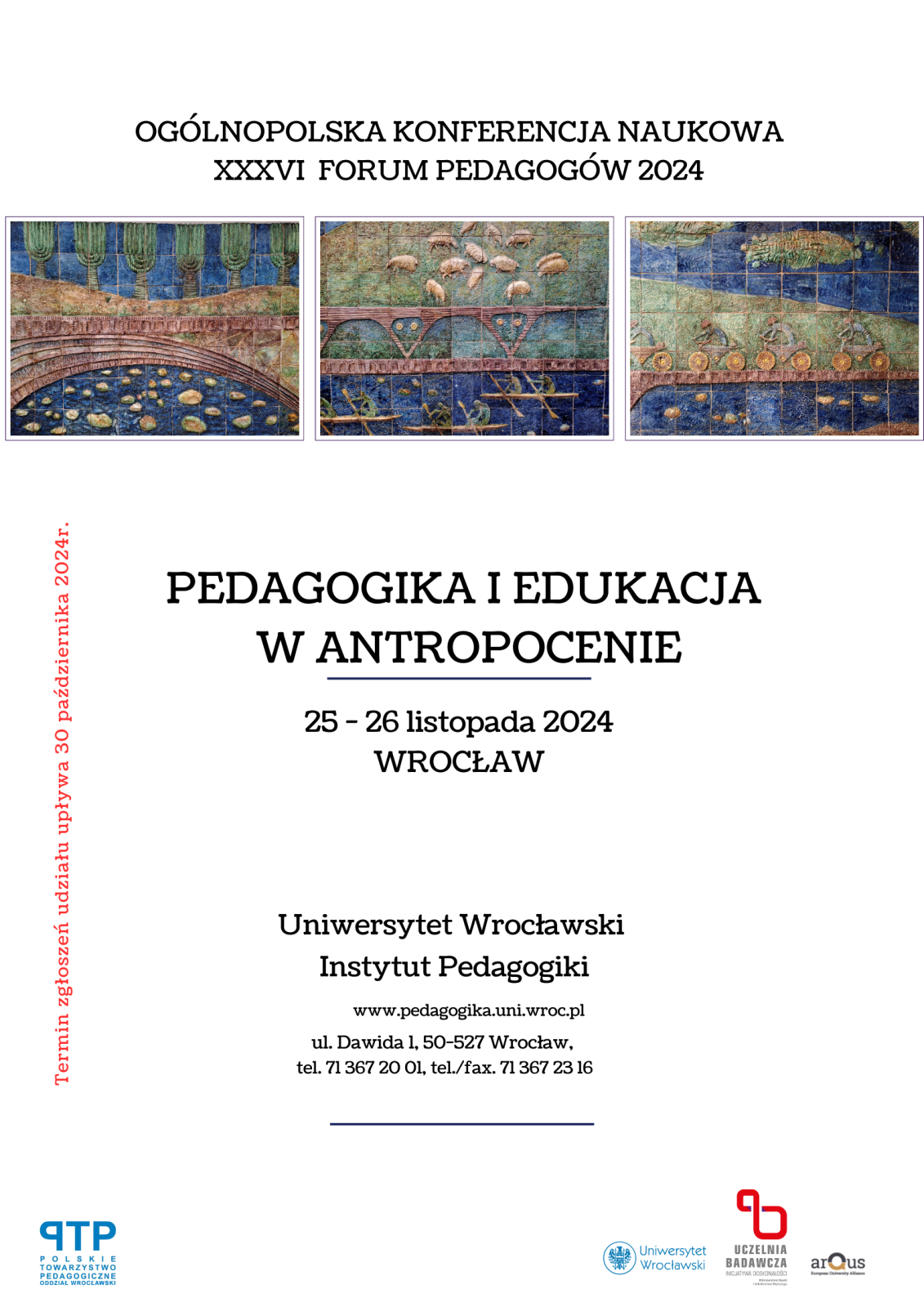
Invitation to participate in the 36th Teachers’ Forum National Academic Conference
The 36th Teachers’ Forum National Academic Conference organised by the Institute of Pedagogy of the University of Wrocław will take place on 25 and 26 November. Representatives of many disciplines will focus on the theme of this year’s edition: “Pedagogy and education in the Anthropocene.”
Applications for the conference have opened with the new academic year. The deadline is 30 October. Link to the application form: https://tiny.pl/dqnp2rcw
The notion of Anthropocene was framed at the beginning of the 21st century by Paul Crutzen and Eugene Stoermer and has stayed for good in the transdisciplinary vocabulary of geoscience, social sciences, and humanities. It indicates the human hiperagency, which deeply and irreversibly transforms the biosphere and geological time. The current situation related to climate changes, ecological disasters, loss of biodiversity, the so-called sixth mass extinction, and global capitalism invites discussions about consequences of the anthropocentric worldview.
It is said more and more often that we live in a time of (poly)risk and polycrisis (Ulrich Beck, Adam Tooze). We witness at the same time mobilisation of social, political, and religious movements; closing the distance between “the culture of humanists” and “the culture of natural scientists” (Charles Snow); and mobilisation leading to integration of transdisciplinary research, artistic, and educational activities for the purpose of a multidimensional change of “the anthropocentric worldview” (Ewa Domańska) and creation of new legal, economic, political, and cultural models, which could promote and develop non-exploitative and ecological coexistence. We are becoming more and more aware of the complexity of processes and mutual entanglements of human and non-human (animal, plant, laboratory, robotic, hybrid, etc.) entities in the overall web of life on Earth.
The sphere of non-anthropocentric philosophies and theories built at the frontiers between natural, social, humanistic sciences, and technosciences is being intensively explored by means of geoscience and climate science. During this exploration, a special emphasis is given to holistic and hybrid views, pro-ecological ethics, the question of life per se (zoe in Greek) (Giorgio Agamben, Rosi Braidotti, Judith Butler), and crucial principia of the Anthropocene: transcending the dualisms of nature-culture (Donna Haraway, Philippe Descola), body-mind, and human and more-than-human (Timothy Morton). Non-binary scenarios of relationality and models of democration of objects and social relations with objects are being created by designing multi-species communities (Donna Haraway, Bruno Latour, Graham Harman, Anna Barcz, Monika Bakke, Grażyna Gajewska, Magdalena Zamorska, Andrzej Marzec, et al) and emphasising reciprocity and supra-species respect and responsibility.
To what extent this transdisciplinary, interspecies, and pro-ecological trend resonates against a backdrop of modern pedagogy and education and therefore in the spaces of shaping attitudes and social imaginaria? What challenges does the climate crisis pose to education and what should be the future of education? The following (and more) questions preoccupy us:
- In what way does the modern pedagogy achieve its own paradigmatic, theoretical, and methodological exploration against the backdrop of the Anthropocene’s challenges? To what extent is it influenced by research shifts of the modern humanities, including the posthumanistic shift (towards objects, animals, plants), ontological, naturalistic, notional, laboratory, neurobiological, cognitive, participatory, postsecular, towards religion and spirituality, towards care? (E. Domańska)
- How does pedagogy handle balancing between social sciences, humanities, and natural sciences? Is it ready to use the resources of hard sciences, tools of cognition provided by these resources, and knowledge and sciences, which are often discredited due to the ambiguous legacy of positive pedagogy?
- Is non-anthropocentric pedagogy (Maksymilian Chutorański) still solely an avant-garde exercise of pedagogical imagination, or is it a useful project of transforming educational theory and practice necessary in the Anthropocene?
- How to modify old and design new pedagogical subdisciplines during the time of polycrisis in the Anthropocene? What problems does the modern pro-ecological education face? What ethics are needed by pedagogy and education today?
- Which of the theories, themes, projects, threads, and impulses in the melting pot of the Anthropocene are currently embodied in social practices of educational nature, what is excluded from them, and why?
- In what way do the formal and non-formal education face the issue of climate changes, malaise of the Anthropocene (Ewa Bińczyk), and polycrisis? Does the Polish mainstream education eqiup with pro-climate knowledge and competence? Is the pro-climate responsibility included in curricula and school textbooks? To what extent does the green education develop environmental and social responsibility and enables a real change in attitudes and social practices to pro-ecological ones? And finally, is it possible for it to build social resilience by preparing to live in the Anthropocene?
We encourage you to read the 1st Announcement of the conference. More details will be found in the 2nd Announcement.
Contact with the office of the conference: hanna.achremowicz@uwr.edu.pl
We invite you to take part in this academic event!
Translated by Jakub Dziubek (student of English Studies at the University of Wrocław) as part of the translation practice.




